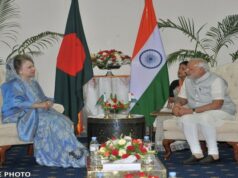Two incidents of violence from Pakistan’s Khyber Pakhtunkhwa province, but both very different from the other except for those left dead by it.
The killing of 17 people deemed terrorists by the Pakistani military on Saturday in Bannu, North Waziristan, underscores the steady uptick in fighting the region is seeing following the breakdown of ties with the Taliban in neighbouring Afghanistan.
As Sharat Sabharwal, former high commissioner to Pakistan (2009-13) explained on The Gist, the situation here can be directly traced to the “ideological affinities and linkages” that bring together the Taliban and groups like the TTP (Tehreek-e-Taliban Pakistan).
“The Taliban has been telling the Pakistanis go talk to the TTP, which is what Imran Khan did when he was prime minister but that approach got discredited as it allowed the TTP to regroup.”
As for the second incident of violence in Kurram bordering Afghanistan, that has once again revealed an ugly and increasingly volatile sectarian fault line, meaning Sunni vs Shia.
Sabharwal argues that while the fault line is an old one, “it is accentuated by the fact that Shias have been in possession of most of the land and there are tribal rivalries. When I was deputy high commissioner (in Pakistan) in the 1990s, a lot of killing used to take place from time to time.”
But these are on Pakistan’s periphery. The current struggle is between Imran Khan’s PTI (Pakistan Tehreek-e-Insaf) and the army fronted of course by the civilian government of Prime Minister Shahbaz Sharif.
“Sharif is complying with the wishes and dictates of the army, so it’s a military regime except you do not have a man in uniform as martial law administrator or the president but he takes all critical decisions including on economic matters,” Sabharwal says.
Although the recent march on Islamabad by the PTI fizzled out, the wonder is Imran Khan despite sitting in prison for over a year, still commands the loyalty of his party, and remain the most popular politician in Pakistan today.
“Cracks have been reported from time to time (in the PTI) and he’s gone backwards, making compromises, that’s a sign of people not carrying out all the instructions of the boss.”
The big question is about Gen Asim Munir, the army chief, who has history with Imran Khan (the latter had him removed as ISI chief in 2019 because he was investigating corruption by Bushra Bibi, Imran’s wife).
As long as he’s around, Imran will probably have to reconcile to sitting in jail, unless he’s able to strike a deal with Munir.
Tune in for more in this conversation with Sharat Sabharwal, former high commissioner to Pakistan.
Thirty eight years in journalism, widely travelled, history buff with a preference for Old Monk Rum. Current interest/focus spans China, Technology and Trade. Recent reads: Steven Colls Directorate S and Alexander Frater's Chasing the Monsoon. Netflix/Prime video junkie. Loves animal videos on Facebook. Reluctant tweeter.




